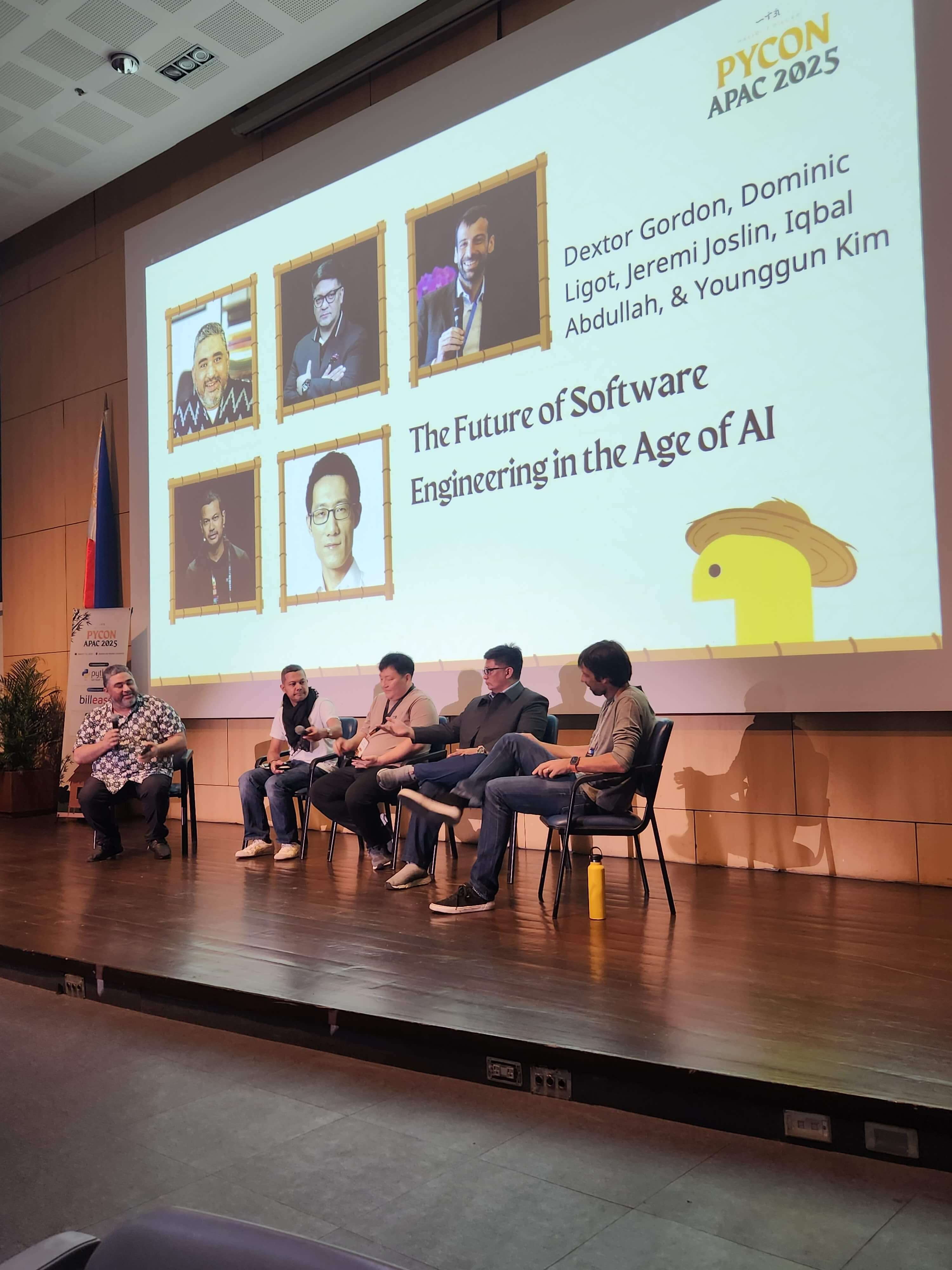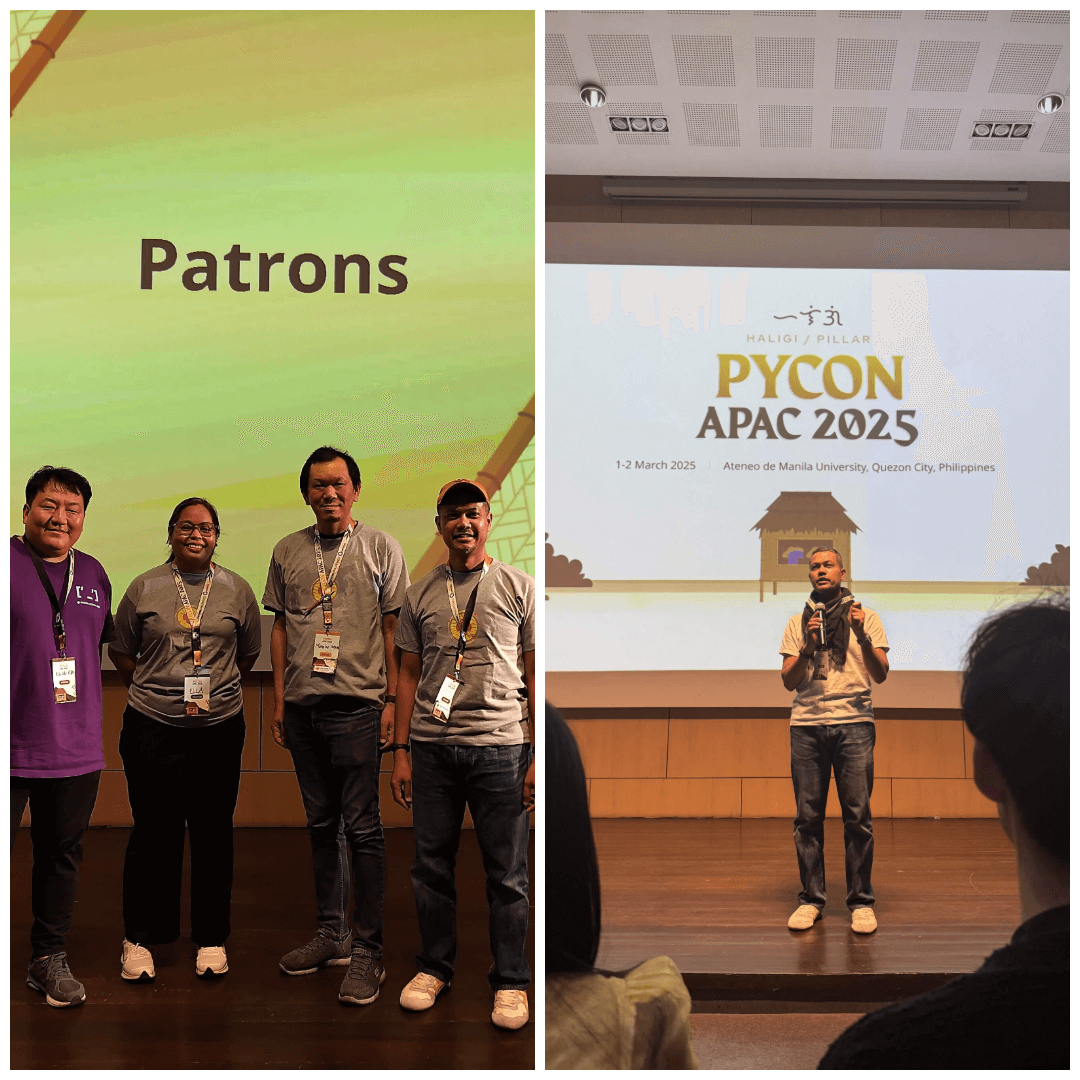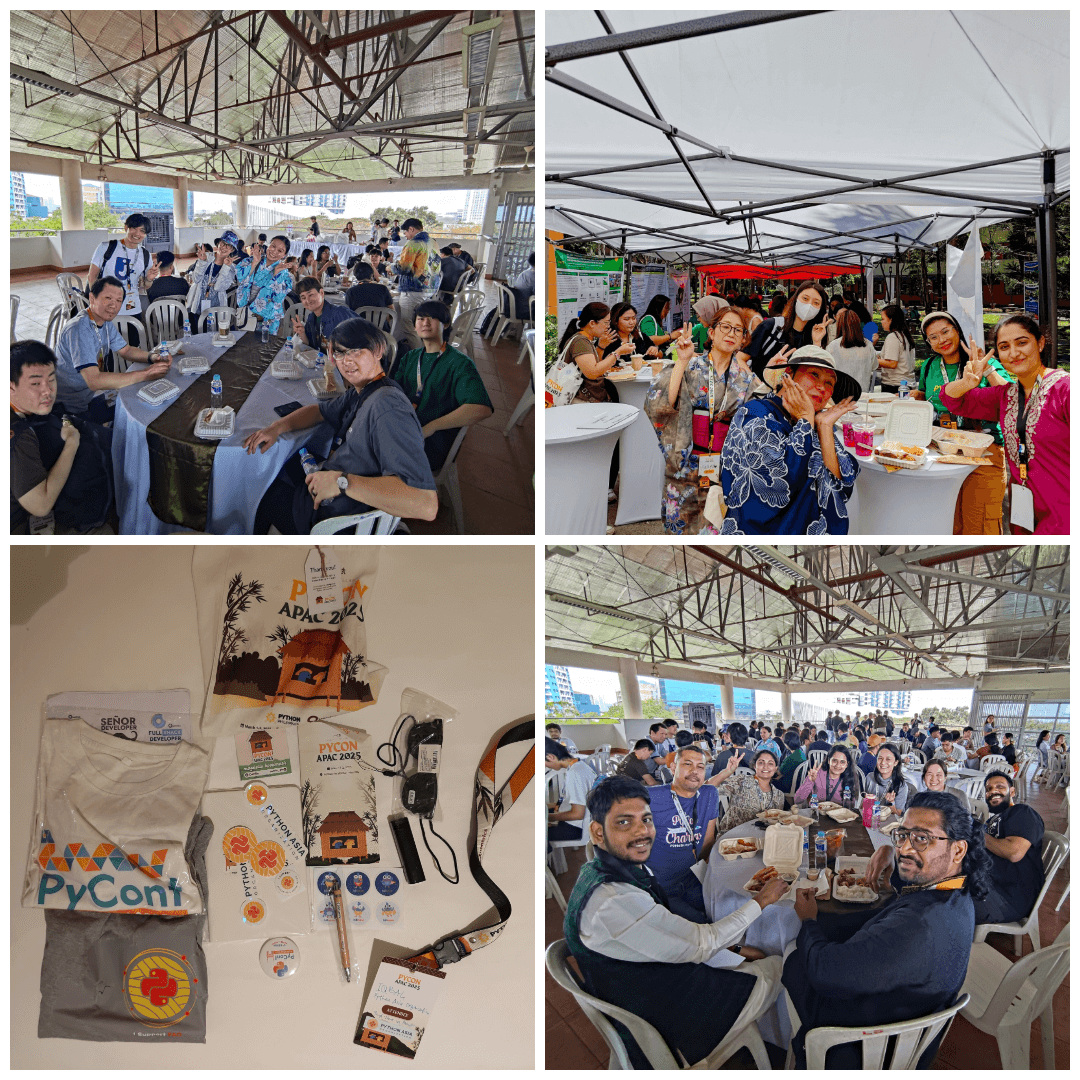Reflecting On PyCon APAC 2025 Part 2: AI Panel, Networking, and Community Building
You can read the first part of this series, Reflecting PyCon APAC 2025 Part 1 here
Participated Session Summary: The Future of Software Engineering in the Age of AI
One of the most thought-provoking sessions I participated in as a panelist was "The Future of Software Engineering in the Age of AI." Sitting alongside other industry experts, I had the opportunity to share insights on how AI is reshaping software development. Engaging in this discussion was particularly exciting because it allowed me to reflect on the real-world applications of AI within my own work at LaLoka Labs and Kafkai.
The panelist who were experienced AI practitioners and leaders in their field alongside myself were:
- Dextor Gordon, who has been working at the intersection of AI and employment since building an AI team in 2016 as the moderator
- Dominic Ligot, who represents the Philippines as Member of the Expert Advisory Panel of the International Scientific Report on Advanced AI Safety.
- Jeremi Joslin, the Executive Director of OpenSPP (Open Source Social Protection Platform)
- Kwong Han Bae, Sre/DevOps at LINE Corporation and a Director of Python Software Foundation
- and myself.
Being on the panel also reinforced how rapidly AI is altering software engineering and how developers must balance automation with human creativity and intuition. We explored how AI is shifting not just technical workflows but also the skills and mindset required for modern software engineering. The conversation was dynamic, touching on both the opportunities AI brings and the challenges it presents, such as ethical considerations and AI-generated code reliability. It was a moment of realization that while AI is a powerful tool, the human element, which is our ability to think critically, problem-solve, and innovate remains irreplaceable.

A panel of five experts seated onstage at PyCon APAC 2025, discussing “The Future of Software Engineering in the Age of AI,” with speaker photos displayed on a large screen. Thank you to Zorex Salvo for the picture
Key Insights:
- AI is shifting the nature of software engineering, with automation handling repetitive coding tasks.
- The need for human oversight remains crucial, particularly in ethical AI development.
- How Python is playing a pivotal role in AI-driven software engineering.
- The importance of continuous learning to stay relevant in an AI-augmented industry.
- AI-assisted code generation is improving developer productivity but requires careful validation.
- The demand for engineers with AI literacy is growing, making it essential to integrate AI education into software engineering curricula.
- AI is influencing software architecture, with new patterns emerging to support AI-driven applications.
- The balance between automation and human creativity remains key: AI tools can support innovation but cannot replace human problem-solving skills.
- Ethical concerns, such as bias in AI models and responsible deployment, were highlighted as critical areas for engineers to consider.
- Collaboration between AI researchers and software engineers is becoming increasingly important to ensure AI tools align with real-world development needs.
- The definition of "software engineer" is evolving. Future engineers may need to understand AI algorithms as deeply as traditional data structures.
- AI-generated code is reducing the barrier to entry for newcomers, but seasoned developers must guide the best practices for maintainability and security.
- Debugging AI-generated code presents new challenges. How do we ensure AI models generate correct, efficient, and secure code?
- AI-driven development is shifting the focus from syntax and implementation to higher-level problem-solving and system design.
- The growing intersection between AI and cybersecurity means software engineers must be increasingly aware of adversarial attacks and AI-specific vulnerabilities. AI is shifting the nature of software engineering, with automation handling repetitive coding tasks.
- The need for human oversight remains crucial, particularly in ethical AI development.
- How Python is playing a pivotal role in AI-driven software engineering.
- The importance of continuous learning to stay relevant in an AI-augmented industry.
- AI-assisted code generation is improving developer productivity but requires careful validation.
- The demand for engineers with AI literacy is growing, making it essential to integrate AI education into software engineering curricula.
- AI is influencing software architecture, with new patterns emerging to support AI-driven applications.
- The balance between automation and human creativity remains key. AI tools can support innovation but cannot replace human problem-solving skills.
- Ethical concerns, such as bias in AI models and responsible deployment, were highlighted as critical areas for engineers to consider.
- Collaboration between AI researchers and software engineers is becoming increasingly important to ensure AI tools align with real-world development needs. AI is shifting the nature of software engineering, with automation handling repetitive coding tasks.
- The need for human oversight remains crucial, particularly in ethical AI development.
- How Python is playing a pivotal role in AI-driven software engineering.
- The importance of continuous learning to stay relevant in an AI-augmented industry.
These were interesting points discussed. Some of them come from the understanding that AI is a boon to us that creates opportunities, while others think that AI is a dangerous tool and need to be used with caution. Like any technology, these perceptions are generally correct. Technology is just a tool, and the outcomes are by how we use it.
I personally am not interested in how the big and gigantic companies use AI. They have shown that they are more interested in quick wins and cutting costs which often results to cutting jobs. But I do believe that AI is a powerful tool that allows us smaller businesses and enterprises to compete better and lead happy lives if it helps us achieve what we have been doing at half the time it took. This is what Kafkai is about.
Participating in this session gave me a chance to share my experiences with Kafkai and how AI can enhance, not replace, human creativity and engineering intuition.
Closing Annoucement and Reflections
The conference ended on a high note with a closing that emphasized the future of Python in Asia. As I stood on stage as a director of the Python Asia Organization and someone who has managed PyCon APAC for the past decade, I reflected on how far we’ve come as a community.
During my closing remarks, I announced a renewed commitment to fostering collaboration among Python communities across Asia (For a more detailed reflection on my experience and the vision moving forward, you can read my full thoughts on my personal blog). PyCon APAC has always been about more than just technology, it’s about building relationships, sharing knowledge, and ensuring that Python remains an inclusive and thriving ecosystem for all.

A two-image collage featuring four patrons wearing conference T-shirts in front of a “Patrons” slide, and a speaker delivering closing remarks onstage with the PyCon APAC 2025 logo projected behind. Thank you to Calvin Tsang for the picture
Final Thoughts: Why Conferences Like PyCon Matters
PyCon APAC 2025 wasn’t just about the talks or even the networking. It was about strengthening the Python community in Asia and ensuring that initiatives like Kafkai can help developers work smarter. For LaLoka Labs, it was a significant step forward in engaging with the developer community and showcasing how AI-driven tools fit into their workflow.
I left Manila with new ideas, connections, and a renewed passion for Python and community building. PyCon APAC 2025 was a resounding success, and I can’t wait for what’s next.
If you attended PyCon APAC 2025, I’d love to hear your thoughts! Let’s continue the conversation! Connect with me on Twitter or LinkedIn and share your experience!

A four-image collage showing PyCon APAC 2025 participants enjoying lunch under a canopy, a group photo of attendees, and official conference items such as T-shirts, badges, and lanyards.
We're a regular at PyCons! You might also be interested in these